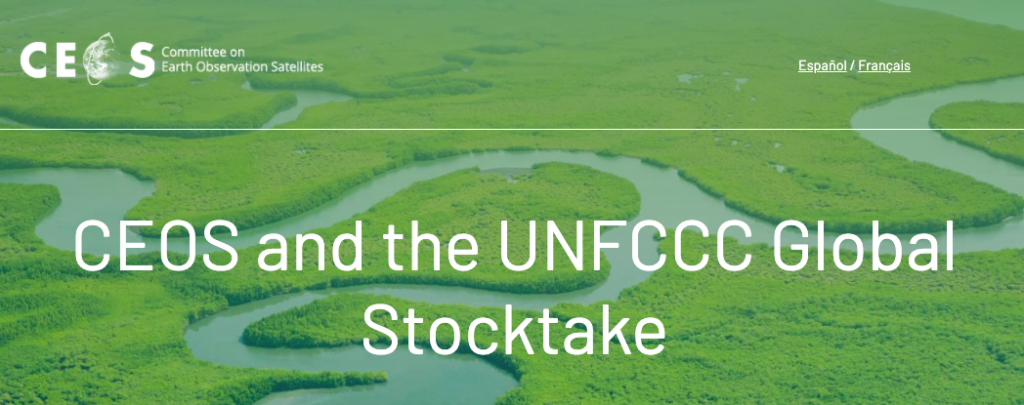The New Global Stocktake Data Portal
 Systematic observations of the Earth’s atmosphere and surface from ground-based, airborne, and space-based sensors are absolutely crucial for the characterization of Earth’s climate. They are what make the work of the UNFCCC, the IPCC and the Paris Agreement possible, and more than half of the 60 or so Essential Climate Variables – the physical, chemical, or biological variables identified as critical contributions to the characterization of Earth’s climate – are largely or exclusively measured from space via satellite instruments! For that reason, countries looking to get smart about the monitoring and management of climate-related issues are increasingly required to get smart about understanding and applying satellite Earth observation data.
Systematic observations of the Earth’s atmosphere and surface from ground-based, airborne, and space-based sensors are absolutely crucial for the characterization of Earth’s climate. They are what make the work of the UNFCCC, the IPCC and the Paris Agreement possible, and more than half of the 60 or so Essential Climate Variables – the physical, chemical, or biological variables identified as critical contributions to the characterization of Earth’s climate – are largely or exclusively measured from space via satellite instruments! For that reason, countries looking to get smart about the monitoring and management of climate-related issues are increasingly required to get smart about understanding and applying satellite Earth observation data.
CEOS Agencies have embarked on a broad range of activities to support countries in doing so, particularly in support of the Global Stocktake (GST) – a fundamental component of the Paris Agreement, being used to monitor its implementation and evaluate the collective progress made in achieving the agreed goals. The GST, the first of which will take place in 2023, links implementation of nationally determined contributions (NDCs) with the overarching goals of the Paris Agreement and has the ultimate aim of raising climate ambition.
To demonstrate the utility of systematic Earth observations, a series of pilot products are being developed to support inventory development verification efforts for the 2023 GST:
- The Joint CEOS/CGMS Working Group on Climate (WGClimate) is developing spatially-resolved global atmospheric budgets of CO2 and CH4,as well as their changes over time.
- The CEOS Agriculture, Forestry, and Other Land Use (AFOLU) Task team has embarked on an effort to identify and harmonize the best available above-ground biomass, forest, land cover, mangrove, and agricultural crop products to support bottom-up inventories for the AFOLU sector.
These two efforts are being closely coordinated to develop Earth Observations products that are best suited to complement the Mitigation and Adaptation efforts being carried out by the Parties to the Paris Agreement.
The primary objective of these pilot products is to begin a conversation among the scientific community, national inventory agencies, the UNFCCC, and other relevant stakeholders to establish best practices for the joint use of conventional inventories and systematic Earth observations – to produce more complete and accurate estimates of GHG emissions and removals and to identify opportunities for improving resilience to the adverse impacts of climate change and fostering low GHG emissions development.

As such, CEOS has launched a brand new Global Stocktake Portal to help countries locate, understand, and apply the rich datasets available from the world’s space agencies. GST Portal resources provide a single point of access to all the datasets and guidance resulting from CEOS GST activities, as a convenient reference for Parties, and for scientific and other users to access, understand, and apply the data. Descriptions are provided for each dataset, along with links to the data itself, available user manuals or guidance documentation, and point of contact information for each case. We invite you to explore the CEOS Global Stocktake Data Portal, available in English, French, and Spanish for further details and access to the datasets of interest, including some world-first prototype inventory products for carbon dioxide and methane.
Note that the portal represents the culmination of substantial work by dozens of teams and individuals across the CEOS community, especially our CEOS Greenhouse Gas and AFOLU Roadmap teams, who worked intensively to ready their respective datasets to feature in the portal.